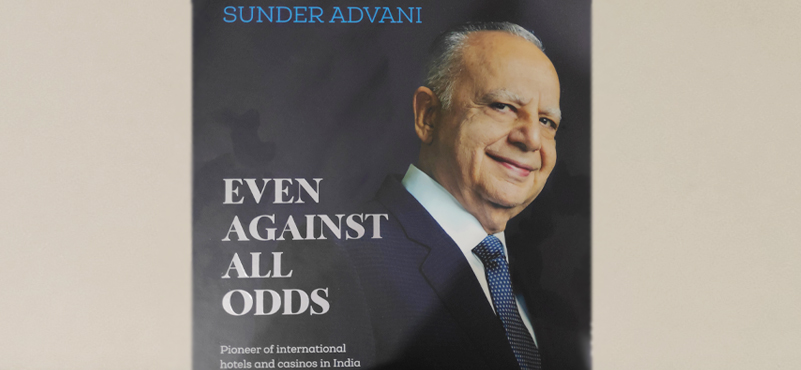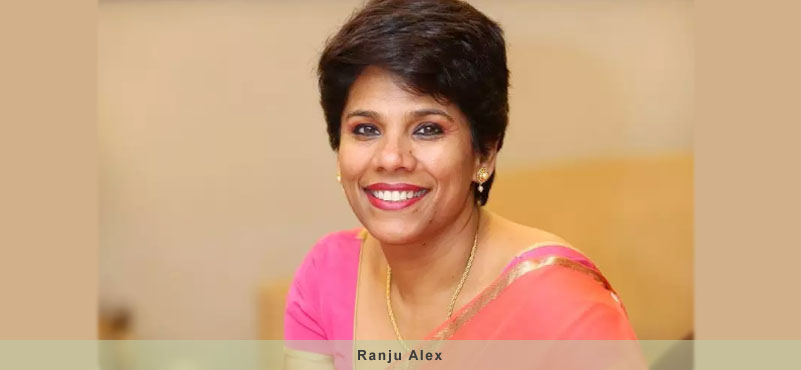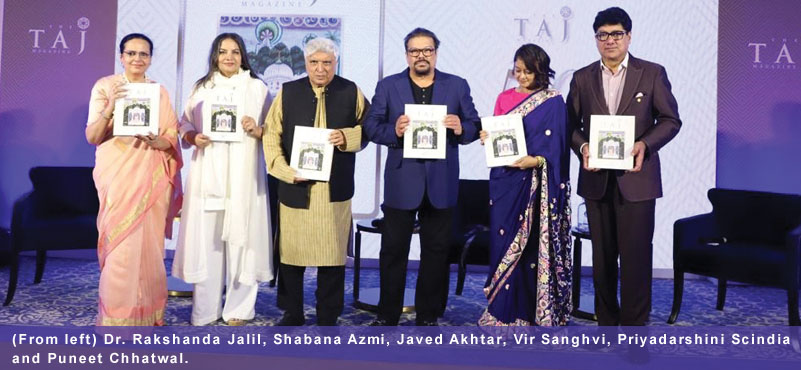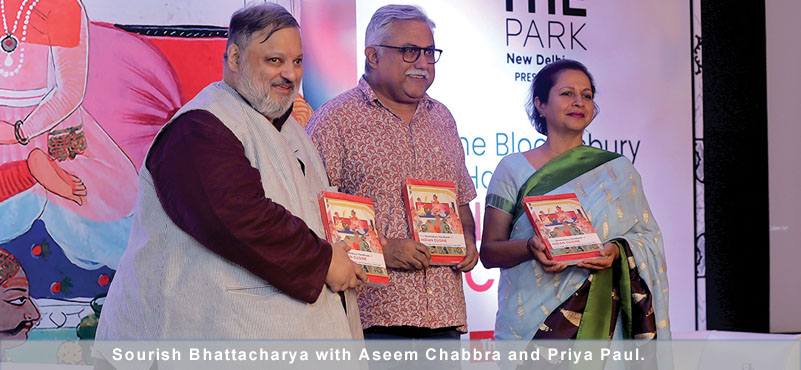An engrossing book review on Sunder Advani’s book by Saaz Agarwal.
Even Against All Odds is a story of dramatic highs and lows, faced with continuous effort, unflagging ambition, steady innovation and good humour. The book is the memoirs of Sunder Advani and covers his very interesting life of eighty years, incorporating lessons learnt by a first-generation entrepreneur, touchingly honest descriptions of mistakes made and with life lessons and business lessons in every chapter.
When Sunder Advani moved to Mumbai in 1969, he knew nothing about the city or how business was done in India. He had lived in the US for fourteen years, first as a student at Temple University and then for MBA at Wharton. He worked his way up as an economist to a senior position with one of the largest management consulting firms in the US. He left his secure future (and his home in the elite Watergate Apartments, Washington DC) to please his father, Gurdas Advani, who was keen for Sunder to start a hotel in Mumbai. Sunder scouted for American hotel chains he could bring to India, but it was a time when India was seen in the US as a faraway and mysterious land. It is a testimony to Sunder’s persuasive skills that he was able to convince Holiday Inns Inc to give him a franchise and later made him head of their operations in South Asia. As a result, Sunder Advani was the first to bring international hospitality standards and mature standard operating procedures to India. The first of the hotels he built in India were the Holiday Inn in Agra, followed by the Holiday Inns in Mumbai, Chennai, Hyderabad and Colombo.
Sunder was travelling to promote the Holiday Inns he had helped build and seeking opportunities to set up more. At the same time, he had started his own business: a flight kitchen in Mumbai. In 1972, he started planning India’s first airport hotel. India had only a few international flights, and most of them took off from and landed at Mumbai’s Santa Cruz airport late at night or early in the morning. Sunder’s Airport Plaza Hotel was the only hotel in the vicinity of the airport, and occupancy was high – quite often amounting to more than 100 percent as transit guests only needed to use the hotel for a few hours at a time.
Even Against All Odds reveals Sunder’s high standards and sophisticated management style: his flight kitchen incorporated the best equipment the business could have, and hygiene standards that were, in those days, rare in India. As for the airport hotel, Sunder installed a swimming pool with a state-of-the-art jacuzzi – probably one of the only jacuzzis in the city of Mumbai. With a great deal of enthusiasm, he also set up a disco, Take Off, in the hotel. It had the newest technology, with a floor of thick crinkled glass and flashing lights underneath, modelled on the one in the recent hit film Saturday Night Fever. Take Off did not restrict itself to aircraft but also incorporated symbols of the recent moon landing!
One of the biggest problems that Sunder faced, and which created a series of challenges at periodic intervals, was his lack of personal funds. Venture funding was still unknown in India. With his strong business education and experience, and with the guts of a path-forging entrepreneur, he had been successful in raising public equity, the most striking being his visionary public issue in 1972 – preceding those of both Taj (Oriental Hotels) and Oberoi (EIH Limited). It was fully subscribed.
However, in all his early ventures, Sunder had no choice but to find partners who would provide the capital while he contributed his efforts and personal network. Time and again, Sunder made all the efforts to do the spadework and set up a running organization – and when it was time to reap the harvest, he was unceremoniously evicted by his partners. Each time it was a jolt and severe setback, and each time Sunder simply got back to the game with new ideas, renewed efforts, and even more determination. One outcome of this pattern, however, was that he became wary of partnerships in which he did not have a controlling share and this was the factor that ultimately restricted the growth of his business – with total support from his wife Meena, his son Prahlad (both dedicated active business partners) or his daughter Lalita.
In 1982 (having discontinued his role at Holiday Inns Inc some years before) Sunder accepted a master franchise by Ramada Inc to bring their brand to India. His first achievement was the Ramada Inn Palm Grove, Mumbai. This was followed by a Ramada Renaissance in Colombo. And in 1988, when Sunder decided to build his own hotel in Goa, Ramada not only gave him their corporate name but also invested in the hotel – a rare arrangement clearly reflecting his track record and Ramada’s confidence in his abilities. One factor that reinforced this confidence was Sunder’s choice of WATG, the multinational architect firm headquartered in Hawaii specializing in global luxury resorts, for his new hotel.
In the late 1980s, Goa was just coming up as a tourist destination and Sunder, with his experience of European tourists in Colombo, seized the opportunity. For the first two decades, Goa Renaissance catered largely to guests who arrived in chartered flights and stayed for weeks at a time. However, this was a seasonal business and Sunder began thinking of ways to attract tourists during the summer and monsoon months when occupancy was low. When he struck upon the idea of setting up a casino, it was met with almost universal disbelief because government permission was considered impossible. Once again, Sunder’s mettle was tested as he campaigned until he received a license to set up Goa Nugget, India’s very first legal slot-machine casino, in 1993.
Sunder petitioned the state government for a license to establish and run a live gaming casino, and eventually acquired one in 1999. He designed and furnished India’s first ship casino, MV Caravela, and launched it in partnership with Casinos Austria in 2001. An evening spent on the Caravela Casino was one of elegant glamour; one which gave the feeling of being in Las Vegas, and attracted well-heeled patrons from across India just by word of mouth. After seven years, when competition began to make the playing field murky, Sunder gracefully withdrew. In 2017 he took another strategic decision – to detach the Ramada association, renaming his hotel Caravela Beach Resort. Business flourished and today Advani Hotels is one of the ten most profitable hotel companies in India.
Even Against All Odds reveals not just Sunder’s rollercoaster business life but also his own priorities of personal dignity and a happy family life. It also shows that he works not just for himself but for the hospitality and tourism industries, and for the growth of the Indian economy. This is endorsed by Amitabh Kant, CEO Niti Aayog and former Joint Secretary, Ministry of Tourism, in the foreword of Sunder’s memoirs. The storyline of this book is supported by a superb artistic design, conceived and executed by Shahna, Sunder’s daughter-in-law. The highly evocative images range from vintage shots of a long-gone era, to high-resolution drone-captured vistas of the luxurious Caravela Resort. The chapter titles are often the catchy titles of Sunder’s favourite songs.
At eighty, Sunder is still passionately involved with Caravela Resort and is continuously envisioning enhancements and making plans to execute them.




































